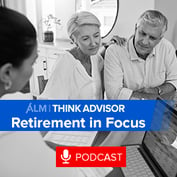For years, industry experts have been predicting the consolidation of the fragmented independent RIA space due to the macro trends of technology competition, aging advisors, declining fees, expanding investor expectations, the race for scale and a much more complex regulatory environment. All of these consolidation mega-trends definitely have played out over the last decade, but at a much slower pace than predicted. According to industry insiders at the MarketCounsel Summit, it’s fair to say that consolidation is not only here, it’s accelerating.
Attorney and regulatory expert, Brian Hamburger, CEO of Market Counsel — a compliance and regulatory consulting firm — opened up the 12th annual event at Miami’s Fontainebleu Hotel in early December with a compelling agenda focused on this consolidation theme.
“This is the seventh record year of M&A in the industry, along with a very robust breakaway broker pipeline,” Hamburger noted in his opening remarks at the 2019 event. “2020 will be the first time in the history of the industry when there will be more independent advisors, 52%, than employee-based advisors.”
But with the increased numbers of advisors comes a corresponding increase in regulatory actions, Hamburger pointed out. “SEC enforcement actions are up 7%, with 36% of those actions against RIAs, up from 23% just one year ago,” he said.
Picking up on the consolidation theme right out of the gate was a well-received panel of growth experts, including practice management guru Mark Tibergien, CEO of Pershing Advisor Solutions; David Canter, EVP and head of the RIA segment for Fidelity; and Bryce Skaff, co-head of the Global Client Group at Dimensional Fund Advisors. Moderated by Eric Clarke, CEO of Orion Advisor Solutions, this panel discussed how advisors need to keep growing to develop sustainable businesses and to avoid getting scooped up by bigger players with more resources.
“Real growth is slow,” Tibergien said. “The markets have been camouflaging a lot of operational sins, as advisors have been relying on past success and not investing enough in growing their businesses.”
Because so many advisors are “accidental entrepreneurs,” Tibergien suggests they define their optimal client and build a business around that persona, while gaining a technical specialty along with an industry specialty, and “get famous in both,” he said. The greatest threat to advisors in this new environment, according to Tibergien, is their “capacity to serve clients.”
Canter contributed further to this theme with a powerful growth message about attracting the right people in a tight labor market through a firm’s mission and purpose. “There are over 5,000 jobs open in financial services, competition is fierce to hire good people, and millennials are five times [more] likely to stay with a company as long as that firm is aligned with their own personal mission and purpose,” he said.
One way to articulate and communicate a firm’s mission and purpose is by becoming a “B” corporation, Canter noted: “B corporations are required to consider the impact of their businesses on employees, customers, their community, suppliers and the environment. As a result, you have the chance to use the B corporation message to communicate your ultimate mission and the purpose of your firm through this strategy.” Currently, there are over 3,000 B corps, 81 of which are RIAs, he said, adding that this trend is just beginning to emerge in the industry.
Another way to grab onto top talent is through M&A, Canter advises.
“According to our recent research on RIA buyers, 87% of the deals done are to acquire talent,” he said.
To put a finer point on this growth mandate, DFA’s Skaff revealed some compelling data on the differences between fast-growing firms and the rest of the industry. “Growth is actually a cocktail of stuff,” he said, highlighting the results of the firm’s recent benchmarking study that showed the separation of the two cohorts, with AUM growth rates for bottom quartile firms of -8% vs. 36% for top firms.
“The firms institutionalizing their use of technology and automating workflows [find that these processes] are key components to growth,” Skaff said. “But it’s not just good enough to have technology; firms need to bring in the human-capital component to systematize processes and firmly integrate technology into the day-to-day client experience.”
Another key takeaway from the fast growers is that they have a much more diversified source of new business. “While most firms gain new assets from referrals, the fast growers also focus on digital marketing and events, which count for 24% of new clients for them, while the average firm only sources 6% of new clients through digital channels,” Skaff pointed out.









 January 24, 2020 at 11:00 AM
January 24, 2020 at 11:00 AM








